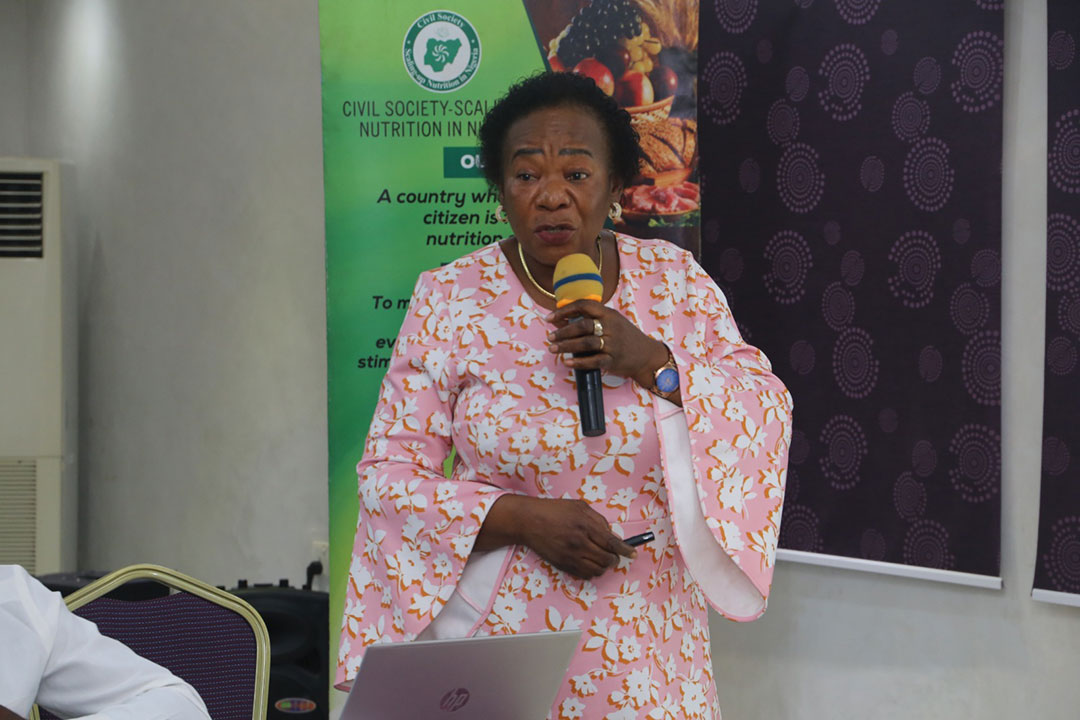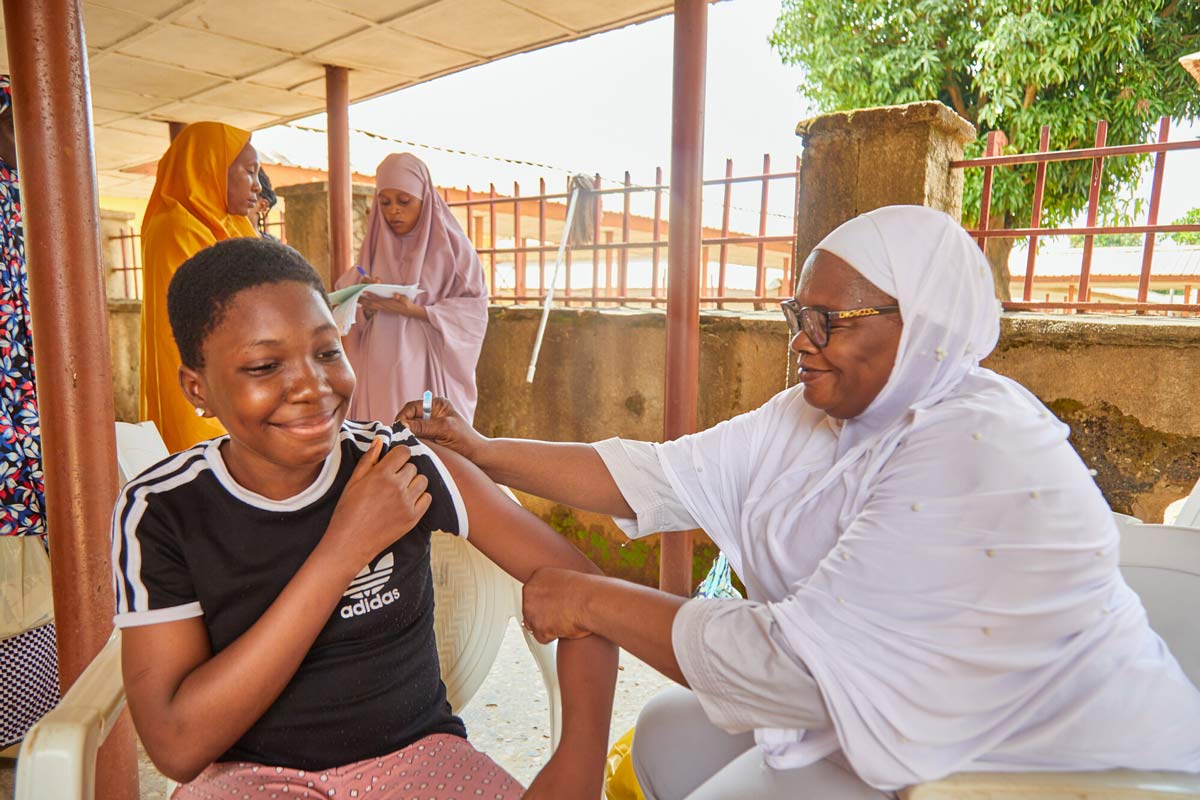Will a supplement pill help protect Nigerian women and children from anaemia during pregnancy?
Poor nutrition during pregnancy carries many risks for both mother and child. Nigeria has approved a switchover to multiple micronutrient supplementation (MMS) to ease those dangers, and advocates say rapid implementation will save lives.
- 7 May 2024
- 5 min read
- by Royal Ibeh

“I am five months pregnant, and I can tell you that I sometimes struggle to eat a balanced diet. It does not come to my mind to add fruits and vegetables to my diet, as the prices of local foodstuffs have skyrocketed in recent time,” 34-year-old Ashia Yusuf of Lagos told VaccinesWork.
To tackle the risks of anaemia in pregnant women and under-five children, Nelson called for the rollout of Multiple Micronutrient Supplement (MMS), a tiny pill which packages 15 vitamins and minerals.
The latest Nigerian National Bureau of Statistics (NBS) report revealed that food inflation in the country surged to 40.01% in March 2024, up again from 37.92 % recorded in February 2024. According to NBS, the year-on-year increase in food inflation was propelled by a rise in the prices of items such as garri, millet, bread, yam tuber, dried fish, sardine, palm oil, vegetable oil, beef, coconut, watermelon and others.
In January 2024 NBS showed that the average price of 1kg of local rice stood at 1,021.79 naira (about US$ 0.75), nearly double the January 2023 price of 514.83 naira (US$ 0.37). The price of boneless beef rose 37% in the same period, while loose brown beans grew 64% more expensive. Meanwhile, the World Bank reports that an estimated 87 million Nigerians – almost 40% – live below the poverty line.
Ashia Yusuf is one of them. “The nurses at Ifako General Hospital in Lagos, Nigeria, always advise me to eat a balanced diet and include fruits and vegetables in my diet to give my body the nutrients it needs for both myself and my unborn child. However, because of the current state of the economy, I am unable to afford them, as my family and I now struggle to eat twice a day,” she said.
Anaemia risk
Pregnancy significantly increases the calories and micronutrients a woman’s body requires, explained Dr Francis Ohanyido, a physician and consultant to public health nonprofit Vitamin Angels in Nigeria.
Ohanyido fears that rates of anaemia and other diseases linked to deficiencies among pregnant women could rise amid food inflation, as women like Yusuf find it harder to access dietary sources of important micronutrients like vitamins A, C, D, E, B1 (thiamine), B2 (riboflavin), B3 (niacin), B6, B12 and folic acid, and minerals like iron, zinc, iodine, copper and selenium.
Inadequate nutrition can lead to anaemia in mothers, confirmed Chito Nelson, the immediate past head of the Food and Nutrition Division, Federal Ministry of Budget and Economic Planning, during a February event on Multiple Micronutrient Supplementation (MMS), organised by Civil Society-Scaling Up Nutrition in Nigeria (CS-SUNN) in Abuja.
Have you read?
Anaemia can cause increased morbidity and foetal mortality, as well as pre-term delivery, intrauterine growth retardation, congenital malformations and reduced immunocompetence, Nelson said.
Pregnant women, meantime, can experience associated breathing difficulties, fainting, tiredness, palpitation and sleep difficulties, and are at elevated risk of developing perinatal infection, pre-eclampsia, complications during labour, and even death and postpartum cognitive impairment.
MMS, a catch-up pill
To tackle the risks of anaemia in pregnant women and children under five years, Nelson called for the roll-out of Multiple Micronutrient Supplement (MMS), a tiny pill that packages 15 vitamins and minerals. “MMS has 20 years of research [behind it], providing clear evidence that it is safe and more effective than IFAs to prevent adverse birth outcomes,” Nelson stated.
IFAs stands for Iron and Folic Acid supplements, which are given to pregnant women as standard in Nigeria. But Nelson points out that the 2018 Nigeria Demographic and Health Survey (NDHS), revealed that 58% of women of reproductive age and 68% children under five years were anaemic, indicating shortcomings in that approach.
To remedy that, the Nigerian government, in January 2021 the Nigerian government approved MMS as a safe and cost-effective route to meeting micronutrient requirements for women during pregnancy. The Federal Ministry of Health approved the nationwide roll-out of MMS in its updated National Guidelines for the Prevention and Control of Micronutrient Deficiencies in Nigeria.
Nutrition and immunity
Nutritional deficits can pose various risks to health, including leaving the body much more vulnerable to infectious disease. In fact, malnutrition contributes to an estimated 45% of deaths among children under five in lower income countries, with most of those fatalities occurring due to disease.
Where malnutrition is rife, the same disease can cause far higher rates of damage than it would elsewhere. Measles, for example, is expected to kill about 1 in 1,000 unvaccinated but otherwise healthy children. In deprived settings, however, fatality rates of 15% have been recorded from the virus.
That means the provision of both vaccination and nutritional supplements is especially important in straitened economic conditions. A review paper released by Gavi and the Eleanor Crook Foundation last year explored the potential for integrated delivery of both life-saving interventions.
Cost of transition
Seven states in Nigeria have taken up those national-level guidelines and have made a commitment to transition from IFAS to MMS, Yadika Charles, nutrition officer at UNICEF told VaccinesWork.
“Plateau, Kwara, Katsina, Jigawa, Gombe, Adamawa and Borno states have made commitment to roll out MMS. Six hundred million naira has been released by four states as part of the Match Child Nutrition Fund,” he revealed.
It will cost Nigeria US$ 26.5 million to procure sufficient MMS to effectively tackle anaemia in pregnant women and children aged under five, Charles said. “To be realistic, we have targeted that 60% of pregnant women in Nigeria will have access to MMS in three years.”
In any case, the switchover may come too late for Ashia Yusuf, who, in Lagos, told VaccinesWork that she had never yet heard of MMS. “It would be great if Lagos state government would consider switching to MMS,” she said, newly caught up. “Most pregnant women [I know] are also struggling to eat healthy.”








